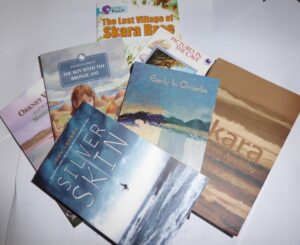
I’ve been working on a paper about the benefits to the archaeologist of exploring fiction. It is a hotly debated topic just now. Afficionados of the Netflix series ‘The Crown’ might have come across Hugo Vickers fascinating breakdown of the accuracy of the series. Readers of The Guardian, may have read Simon Jenkins’ discussion of fabrication and veracity in films. And it is well worthwhile exploring Hilary Mantel’s 2017 Reith Lectures.
A different aspect has been puzzling me. One school of thought would argue that there is nothing new or exploratory in fiction because it can only ever be a reflection of the world within which we live. Because of this they say, the power of fiction to open our minds to new worlds or introduce new ideas and experiences will always be limited. In this way presentations about the past can only ever be reflections of the present.
While I agree that the creators of fiction will always be bounded by their own experience and imaginations. I don’t agree that it follows that fiction will be unable to introduce the reader to new ways of thought. Any visit to the Library, or to a bookshop, quickly reveals the wide range of those who write. They don’t all come from similar backgrounds. While they clearly do reflect the breadth of experience and vision across the globe today, this is a breadth that transcends the experience of any single reader.
And, of course, we are not the only generation to write. People have been writing down their thoughts and stories since long before the invention of paper. Before that there were stories, handed down and embellished across the generations. A surprising amount of this older fiction has survived today, and it, of course, does not reflect quite the same concerns and circumstances with which we are familiar. Some of it is very different.
So, while I have to agree that the literary pool does have boundaries, I don’t agree that these boundaries are detrimental to those of us who wish to use their reading to broaden their horizons. With regard to the depiction of the past, this means that yes, it will, of course, always depend on the writer’s own experience (in addition to other things such as their research). But that does not mean that it is impossible to gain new insights or experience from reading novels and stories that purport to bring to life a particular period or event. They may be written by someone who grew up in a different part of the globe, or among a different community, or even decades or centuries ago. They may be written by someone whose research extended to examining original documents or research reports.
For that reason, I shall continue to enjoy reading fictional accounts of the past. I shall try to ensure that the material I read has been well-researched and sticks to acknowledged boundaries of fact (no rabbits or chickens in Neolithic settlement sites). And I shall still support my favourite authors. Yes, I have to take the research context at face value. And yes, there may well be elements that I might consider debatable. But, in general, I find that reading and watching fiction have become enjoyable, and thought provoking, ways in which to develop my imagination.
You must be logged in to post a comment.